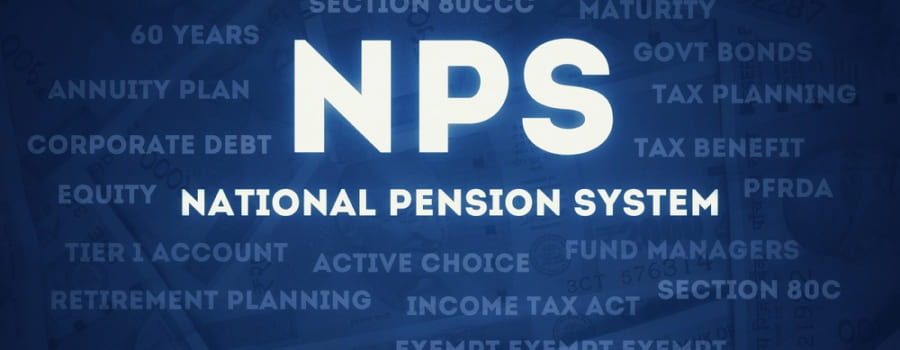Retirement is the most treasured part of your life. You get relieved from your family and professional obligations at that time. However, financial stability is one aspect that helps you live peacefully in that part of your life. Different products ensure a happy and self-sufficient life after retirement. The National Pension Scheme is one of the most popular and best-recommended products for retirement needs. In addition, it offers several tax* benefits apart from the regular income for retirement life. Here is a detail about it for your reference.
Before we get started knowing NPS for tax-saving benefits, let us understand what NPS means and how it is beneficial.
What is the National Pension Scheme?
The National Pension Scheme is a long-term investment plan introduced by the government to secure your life after retirement. You will have to invest a certain amount in your NPS account regularly. It will accumulate to a huge lump sum at maturity when you turn 60. Then, you can withdraw a portion of the accumulated fund and need to utilise the remaining portion to purchase an annuity plan for a regular income during your retired life. In addition, you can utilise the NPS for tax*-saving objectives.
NPS investment is made available in Tier I and Tier II accounts. Tier I is compulsory, and Tier II is voluntary.
NPS Tier I Account
Tier I investment is made in the financial securities market. The minimum contribution to this account is ₹1000 every year. And there is no maximum limit to this investment. In addition, you can choose between Active Choice and Auto Choice modes of investment. In the Active Choice mode, you can decide on the type and proportion of investment between government securities, equity, alternative assets, etc. In the Auto Choice mode, the fund allocation is pre-determined based on your risk appetite.
When you invest in a Tier I NPS account, you can make up to 3 partial withdrawals, which should be at most 25% of your total contribution. You can also opt for a premature exit after 3 years of investment. However, in that case, you can withdraw 20% of the investment and use the remaining amount to purchase the annuity plan.
NPS Tier II Account
The Tier II investment provides the flexibility of investments and withdrawals. The minimum initial investment to Tier II is ₹1000 and can be in multiples of ₹250 for future investments. Moreover, you can invest in and withdraw from it at any time based on your requirements. There are no choices of investment modes in the Tier II account. The investments are divided between equity between 10% and 25%, debt up to 90% and money market instruments up to 5%.
Tax Benefits of NPS Investment

Now that we have gathered the important pointers regarding the NPS investment, let us understand the tax benefit under NPS. It will help in making wise investment decisions.
The following benefits of the NPS section in Income Tax are applicable for the Tier I NPS investment.
- Benefits to employees based on self-contribution - You are eligible for an NPS deduction in Income Tax for your contribution based on the following Sections of the Income Tax* Act 1961.
- Deduction of up to 10% of your salary (Basic Pay and Dearness Allowance) under Section 80CCD(1). However, the deduction is up to ₹1.5 Lakh under Section 80CCE.
- An additional deduction of up to ₹50,000 under Section 80CCD(1B). It is over and above the NPS deduction under Section 80CCE.
- Deduction of up to 10% of your salary (Basic Pay and Dearness Allowance) under Section 80CCD(1). However, the deduction is up to ₹1.5 Lakh under Section 80CCE.
- Benefits to employees based on employer's contribution - Your employer's contribution will also qualify for a tax* deduction. The deduction is up to 10% of your salary(Basic Pay and Dearness Allowance) under Section 80CCD(2). It is over and above the limit of ₹1.5L under Section 80CCE. And the deduction is up to 14% if the employer is Central Government.
- Benefits for self-employed individuals - Self-employed individuals who contribute to the NPS investment will also qualify for NPS tax benefits.
- Deduction of up to 20% of the gross annual income under Section 80CCD(1) and up to ₹1.5L under Section 80CCE.
- An additional deduction of ₹50,000 under Section 80CCD(1B) over and above the deduction under Section 80CCE.
- Benefits on maturity - You will qualify for an NPS tax exemption of up to 60% of the maturity benefit available for the withdrawal under Section 10(12A). Therefore, the withdrawal from the NPS investment is tax-exempt, up to 60% of the amount payable at the time of the exit.
- Benefits on partial withdrawal - Partial withdrawal of up to 25% of your accumulated corpus is tax-exempt. However, this NPS benefit in income tax is applicable after 3 years of investment.
For the Tier II NPS account, the investments will qualify for a tax* deduction under Section 80C of up to ₹1.5L. However, this NPS deduction in income tax* applies only to central government employees and after 3 years of investment. Apart from this deduction, there are no other benefits under the NPS income tax section for investments made in the Tier II NPS account.
Life Insurance for Retirement
While the NPS investment can provide various retirement and tax* benefits, life insurance plans can provide such benefits with enhanced financial protection. For example, comprehensive life insurance plans provide savings and insurance benefits. You can ensure a life cover to secure your family in the event of your unexpected demise at any time during the policy tenure and guaranteed1 returns at maturity. Insurers also provide retirement plans that provide guaranteed1 returns and annuity plan options.
At Tata AIA Life, we provide different savings insurance and retirement plans. In addition, when you purchase our policy, you can customise the product based on your financial needs by choosing the mode of premium payment such as the limited or the regular premium payment, choice of payout option between the regular income, lump sum and combination of both, etc.
Conclusion
Retirement is the most important part of your life. Financial planning with adequate funds for retirement can help you live in peace because you can ensure a financially independent life. The National Pension Scheme is a retirement plan introduced by the government to accumulate funds for life after retirement. It provides various tax* deductions and exemptions subject to the terms and conditions of the Income Tax* Act 1961. You can evaluate the benefits over the long term and make wise investment decisions.
L&C/Advt/2022/Dec/3116







 FOR EXISTING POLICY
FOR EXISTING POLICY 
 FOR NEW POLICY
FOR NEW POLICY 




